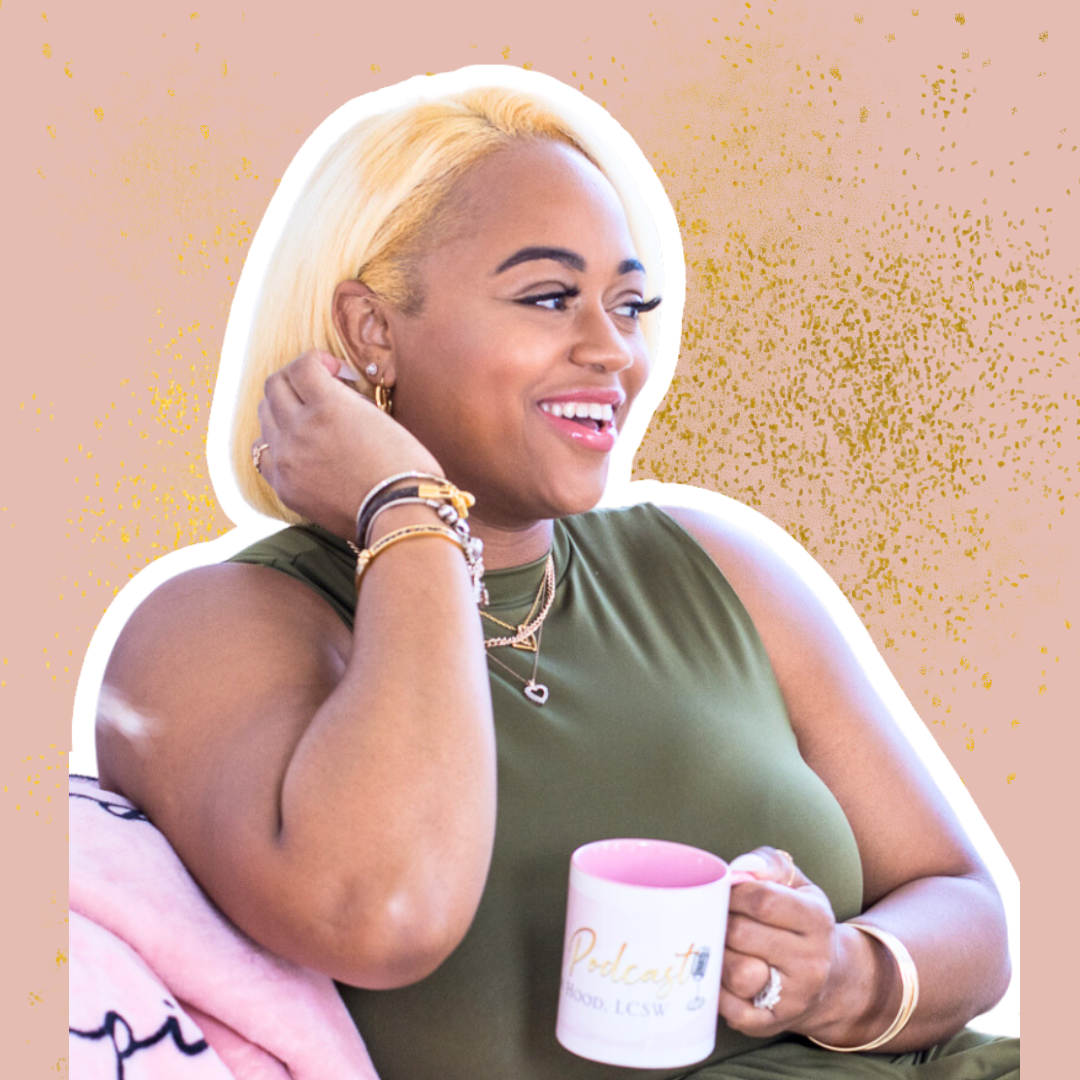Episode Transcript
[00:00:04] Speaker A: You're listening to the Poist Powerhouse podcast. My name is Doctor Sita Hood, and I'm obsessed with empowering women like you with practical life strategies to live authentically without compromising your wellness. I used to be caught up in the hustle hard mentality until I learned that my quirky little traits I thought weren't that important, actually turned out to be the secret sauce. I needed to step boldly into my purpose and create impact, not only in my life, but so many amazing women around me. Organizing your schedule, launching impactful programs, redefining leadership without code switching or compromise, and stepping boldly into your God given assignment are all topics we'll discuss here.
[00:00:55] Speaker B: Think of this podcast as that Sunday.
[00:00:57] Speaker A: Brunch with your girls that feels so therapeutic you can't wait to get to it. But let's clarify. This is not a substitute for a relationship with a licensed therapist. All right, grab your notebook and your coffee or your tea. We don't discriminate over here. And let's start the show.
[00:01:23] Speaker B: For another episode of the Poist Powerhouse podcast. I am your host, doctor Sita Hood, vision architect and licensed therapist. What's Nicomug today? Today we have some good old pumpkin spice coffee. And, yes, I'm still doing iced coffee. Okay. I'm feeling really, really good. Fall is my favorite season, and that is where we're headed. And I know you hear my voice, and you hear that there is something going on. The good news is I am not sick, and I'm not feeling sick. I just lost my voice from screaming like a mama in the stands for my daughter's track meet. So that lets you know how hard I go for my people. Okay. The voice is doing what it does, which kind of sucks, because obviously, I'm a therapist, so I talk for a living, but I neither here nor there. It's not the first time it's happened, and it probably won't be the last, but let's get into it. Have you ever heard a female say that she can't be friends with other females because they're too catty? I know that I've heard that before, quite often, actually. And in reality, I think that it's supposed to be like a shield of strength or something, but in reality, it makes my heart hurts for that woman. It makes my heart go out to her, like, not in a form of pity, but like, what she's really saying when she says that is that she's been hurt so deeply by other women that she's too afraid to open up her heart. And trust again, real talk as we're growing up, if we keeping it on, though, all of us have been Peter, all of us can fall into catty behaviors. All of us have said too much. All of us have gotten too carried away. All of us have done too much and been bogus. That's just the way life is. You are the villain in somebody's story even now. But growing up and, like, trying to find your place, you probably were even more of a villain because you were again trying to find your place. It's part of learning how to be a good friend. But the sad reality is that a lot of us have grouped all women together in this bucket of betrayal. And that is a skewed perspective because not every woman is like that. What's interesting is that this perspective or variations of this thought process tend to happen more to women that society deems as successful. Now, personally, I think that this has something to do with climbing the corporate ladder or building up your business in male dominated society or male dominated industries that place insane demands on women. So the few women who are brave enough to try are often pitted against each other automatically to compete for a spot when there's really room for all of us and plenty to go around. And I want you to think about how this shows up even in your friendship. If you've ever been the person that's like, who you been hanging out with, girl. Uh uh. That wasn't me. Uh uh. You hanging out with her a little bit too much. Now, come on. Come on. And you are serious. Like, sometimes people play like that. But if you are serious, that might be a sign that you are one of these women who has been brainwashed into competing with other women, even in friendship. Some form of this belief is the core for all of these reasons that successful women have trouble maintaining friendships. And what I mean by some form is some women flat out believe that they can't be friends with women. Some women believe that they're not a good friend to other women. And the thought process is because if I was, maybe I would have more friends. And so many other narratives, and some of these narratives we're going to get into inside of this episode. Hey. Hey. Aren't you tired of running around like.
[00:05:40] Speaker A: A chicken with your head cut off? How many times have you promised to do better with your wellness routines, only to let life get on top of you again. I want to invite you to pause and pour by downloading my app. The lavish haven, your sanctuary for cultivating daily wellness. It's completely free to use you'll start with our pause and pour quiz and then access our signature daily and weekly wellness trackers, mood playlists, elevated emotions, collections, scripture based guided audios, and so much more. Hit the link below to start today.
[00:06:20] Speaker B: Again, there are so many reasons and factors that contribute to a woman's outlook and how she chooses to show up in her relationships. But one of the top reasons it's hard for successful, ambitious women to maintain friendships is because they have unrealistic expectations, or people have unrealistic expectations of them. So successful women sometimes assume that people understand what it's like to function in their world, and therefore they understand them and their actions. And most of the time, that's just not true. It's just not true. You've got a totally different level of ambition, likely than most of the people around you. And there could be things that you're doing that don't make sense to somebody that you're attempting to establish a relationship with simply based on their past experiences. I remember when one person and I were just getting to know each other, and she would show up really, really strong in the relationship, and then she would disappear. So she would show up strong, disappear, show up strong, disappear. And it was a lot of this cycle, and I finally got tired of it because the behavior was so confusing to me. And then once we talked, I understood that she was behaving this way based on her past experiences and how she understood friendships to be. So now when she takes her breaks, I know what it means for her, and I give her time and space because I know that, you know, maybe she's going through something or, you know, there's something there that she needs time to process. And so sometimes people also have the unrealistic expectations to have certain levels of access to you, or, like I did, incorrectly assume that you just don't care about the relationship based on your behavior. And the thing is, most women don't actually confront the behavior. They just fall back and return the same energy, not knowing that the whole time, you know, you're starting beef for no reason. Sometimes ambitious women are not given enough grace in their relationships for their busy schedules or for the times when they fall off the grid. They aren't falling off the grid just because they don't care. It's because they're managing so much and they might be struggling to keep up with it, and they just didn't get a chance to get back to you as quickly as they would like. And let's keep it condo. A lot of times it's because they over commit in their relationships and spread themselves too thin.
They promise to show up one way and they really, really, really mean it. But their capacity just isn't big enough to meet the demands for everybody in their life. And this can be disappointing to you and also to them. But the good news is this issue can be solved with having an open, honest conversation about the dynamics of the relationship and how you expect to move forward. It doesn't have to escalate to a returning energy or cutting people off, and there could be a perfectly logical explanation for everything that they're doing. Another reason successful women have trouble maintaining their friendships is because sometimes they don't know how to draw a healthy boundary. And this happens for a couple of reasons, with one of those reasons being past hurtful experiences and not knowing how to be vulnerable. And let's be clear, there are different versions of not knowing how to be vulnerable. Oversharing versus under sharing, personality differences and so much more. Here's what I mean when I say oversharing versus under sharing. Vulnerability is a perfect balance of sharing and knowing when to share. What with who? Oversharing is impossible in a safe relationship. I would also argue that undersharing is impossible in a safe relationship. And here's what I mean by that. If you have fears that people are going to tell your business, or that you said too much at the Sunday brunch, or did too much when you were out at somebody's house, it's likely because you don't fully trust the person that you were talking to. And maybe you went out on a limb to try to see if you could trust them. But when you trust someone, even in sharing something vulnerable, you know that you're safe. You don't have to second guess it. You might feel nervousness when you're talking and when you're saying the words out loud, but when you're done sharing, you're good. And I'm arguing that you can't under share because when you feel emotionally safe in a relationship, you automatically pour out your whole self. There are no restrictions for how you show up. So it can be confusing for successful women to find the right balance of vulnerability, even if we go solely based on experiences in the workspace. And I specify this because women in corporate know that most often, as sad as it is, people don't operate with integrity. But in the same token, as a businesswoman and a leader in your field, trying to find high quality partnerships for your company is also hard because too many people don't have values, morals. And then you can't find people whose morals and values are in alignment with yours. It's rough out here. And me personally, I only want to partner with people and businesses that God called me to partner with who have integrity and compassion as one of their highest values. So as a result of these experiences professionally, it can make it really hard to find the right balance of vulnerability, personally. And then if we're talking about personality types, when we meet other ambitious women, there is an assumption that they are just like you. You get really giddy, you get excited. It seems like you guys are twins. Like, it's like twins. Where have you been? Nobody knows me like you do. Nobody. But in reality, though, in reality, though, even people with the same personality type are not just like you because their life experiences have made them a little bit different. Now, maybe they understand your personality a lot more than most people, but they're not just like you. And it's easier to just walk away from a relationship instead of carving out the time to take to understand personality differences. Another contributor to your level of vulnerability is if you're one of these ambitious women and your past experiences with your mother were not so great or even how you saw adult females interact when you were a kid. And see, like, I grew up with shows like girlfriends, my girlfriend, come on, sing it right. Mozarta, eat sita. Hey, Moesha, come on, full house. Saved by the bell, Arthur. And all these shows that were rooted in high quality friendships as the basis of the show. So on top of what I saw in real life, I also saw examples of high quality friendships in these tv shows. These past experiences with your mother could be how your mother treated you and how you saw your mother treat her friends or people that she cared about. It's a good idea to pause and take some time and sit down to try and figure out how your mother or your relationship with your mother made you feel and to try to figure out how your mom's influence shaped your current view of your relationships between women. You never know what you'll find there. And some questions that you might want to consider. Did your relationship with her and make you want to stay away from females, or did it make you long for friendships like hers? Is it the reason you struggle with boundaries now? Because maybe you saw her be a ride or die for everybody and the feelings weren't mutual. Did you see her constantly getting hurt by other people? And do you notice that pattern in yourself? Was she a mean girl and now you are a modern day mean girl. All these things matter. Another contributor to the lack of vulnerability is the fear of mixing business and friendship. And as an ambitious woman, I can tell you that it is so hard when you meet an amazing woman in a space that's not designed for friendship, because all you want to do is be her friend. And what I mean when I say not designed for friendship is like, I mean, in a work context or for me, therapy, or going to your doctor. And your doctor is super cool for your attorney, and the list goes on and on and on. But, I mean, I feel like doctor and attorney, maybe, depending on the context. So you think to yourself, in another context, we could be friends.
We could have been solid friends. And in some situations, like, if you meet an amazing woman on your job and you're a hairstylist, then you can actually grow to become friends. But you still might carry that fear of vulnerability, and you might be afraid that that would damage the other parts of your relationship. And sometimes the deep emotional connections that characterize female friendships can be overd.
And we can't deny that, because we all got some friendships that are overwhelming, right? Like, um, some. Some relationships, some people are a lot. They're a lot to interact with, and you love them. To your core, you love them. That's a little bookie, right? But the relationship is a lot. It's a lot. And the intensity of these relationships can lead to conflict and maybe even emotional burnout, not just with that relationship, but with a lot of other relationships, because you're so overwhelmed from the emotions and the weight of that other relationship. This can make it difficult to sustain relationships over time, because you are just tired of the emotional roller coaster. And let's be honest, pretty often women take rejection or conflict very personally. Okay? And that just adds fuel to the fire, kind of going back to something we touched on earlier. A marginalized work environment can also contribute to why you might be having trouble maintaining friendships. And I know you probably like, what, girl, that ain't got nothing to do? Hold on, hold on. Hear me out. Hear me out. Okay? Hear me out on this one. Based on the impact of the stressful work environment, it's easy for women to develop imposter syndrome about their ability to show up, even in their friendships. Because, again, in workspaces, not just in corporate, this happens in entrepreneurship, too, but in workspaces, there's this mentality of hustling and women being pitted against each other and comparison and so many other dynamics. And in the midst of that, you develop imposter syndrome around your abilities. And because you are a whole person and your work and home environments both contribute to each other. Your feelings are inevitably going to overlap. Imposter syndrome, even in friendships, is a real thing. I have a friend who faces this, and she doesn't think that she's a good friend. And every time this comes out of her mouth, I'm like, girl, what are you talking about? You're an amazing friend. I've never seen you fail to show up for somebody. I've never seen you not be clear in your boundaries or even say, hey, I don't have the capacity for that. And that level of communication, that level of emotional intelligence, honey, that is top tier, okay? So stop playing. Because one thing I don't do is play about my friends, okay?
That's what I say.
Okay, getting back to that. So anyway, I'd be like, girl, I don't know what you talk about. You're an amazing friend. And listen, now I'm talking to you. Did you know that women of color in particular experience imposter syndrome in their friendships even more than their counterparts do, specifically due to compounding factors like, and I'm just gonna say it, and if you don't like it, that ain't my business.
Factors like race and gender. And I know people be thinking we'd be making it up, but we're not making it up. It's because institutionalized racism and gender bias show up everywhere. And so they tend to, women of color feel like they're not worthy of quality friendships and don't belong in certain spaces. For example, if you live in an affluent neighborhood and you are finding yourself new in that space and it's not something that you're used to, it can be really easy to feel like a phony or to feel like you don't blend in anywhere. And to feel like you're not as good of a friend because you don't show up like people in this neighborhood do, where there's a certain cultural norm in this specific neighborhood, so you can feel like you don't belong in certain spaces, you're not worthy of friendships, of course, specifically due to systemic oppression, which we hate. And of course, doctor Hood is going to link an article to back up the statements, okay? Because what I'm always going to do is back up what I'm saying with research. You feel me? So you want to check the show notes if you have any questions about that dynamic, because it is a very real dynamic. And that self doubt that she feels in the workspace and the microaggression that she experiences during the work day most certainly carries over. And I'm gonna say it one more time, just. Just for the people in the back. Just for the people in the back. Just for the folks in the back. If you think that microaggression doesn't exist or that black people make it up, we not making it up. We not just go down a TikTok rabbit hole on microaggression, and you will start to see all sorts of examples. Or date a black woman, or date a black man or a person of color, or, you know, have a black friend. And not just specifically for that reason, but, like, trying to understand things from a person of color perspective. But this is a whole different episode, and I'm gonna come on back to where we were at. Okay, but it's relevant anytime a black person is talking about, don't. Don't you. Let me say, let me. Let me save a friendship or save a relationship. Don't you tell them that they didn't experience microaggression. Don't do it. Don't do it. Don't do it. Don't do it. Because even if you don't see the problem, you just may not have enough context or have experienced things in life to understand how microaggression looks when it's slapping you in the face. Okay? So just don't do it. Even if you don't understand, just wait for the understanding to hit. Okay, moving on. Anywho, the constant state of self doubt and the need to prove yourself takes a toll on you, and you can inadvertently create barriers to forming and maintaining healthy relationships and healthy, close friendships. And then this internal struggle can make it difficult to be vulnerable and open with your current friends. You see how that's all connected? Women in marginalized work environments tend to rely heavy on their friendships to meet their core psychological needs, because those needs are not being met in their workspace, they're not being validated as they should in their workspace. And sadly, they will look for these needs to be met even if the friendships are not that high quality. And sometimes the stress and the challenge of the work take so much of an emotional toll that there's very little energy left for their relationships.
Okay, this one right here, it's a big one. It's a big one. And I call it the social media effect. It's the misconception that if your friendship does not look aesthetically pleasing, if you're not having picnic brunches with your friends, if it doesn't look like what you see on social media, you're not a good friend. But just like so many other things in life, your life experiences are different. Your life is different. You think and you act differently. You're going through different things. So that means that you're going to show up differently. And remember, parts of social media are staged. It's called content creation, and we know this, man. Okay? I just couldn't resist that. Let me know if y'all be getting all of these references that I be throwing in, okay? Because the references be top tier, if I. I do say so myself.
Okay. Getting back to the topic at hand, I do love a good, aesthetically pleasing Instagram, but I also understand that it's probably not realistic for me to be at my friend's house every day or constantly going out to brunches. Why? Because grown people got bills. Grown people got business, grown people got purpose saved. Ambitious women have assignments that the Lord is trusting them to carry out. And part of it could be at brunch, but all of it, all of it ain't at brunch, boo.
So with all this grown woman business to handle, we just can't get together every day like you see some people do on social media. Social media also creates very believable illusions. And one of those illusions being that people who are surrounded by a lot of people automatically have a lot of friends or are friends with everybody. But what is most likely the truth is that those relationships lack depth, because deep rooted friendships require deep rooted work. Sometimes we get caught up in the trap that we have to have a large quantity of relationships as opposed to looking at the quality of relationships. And the superficiality of social media can definitely be a hindrance when you are trying to establish meaningful, long lasting relationships. Because let's say that you do all the stuff that you see people do on social media, but you still feel empty, but you still don't feel like those relationships are meeting your core psychological needs.
You gotta ask yourself, is it for aesthetically pleasing relationships? Is it for surface level relationships? Is that what you're looking for? Or are you looking for deep rooted, authentic, high quality relationships?
[00:26:48] Speaker A: It's time to talk about what I've been loving. Product recommendations, shout outs to family and friends, and overall gratitude. Let's get into it.
[00:27:02] Speaker B: Welcome back to another what I've been loving this week. I have been loving the Archer and Olive Journal. An interesting pattern that I've observed about myself is when the fall season comes, I tend to journal freehand, like with pen and paper, and I tend to journal digitally when it's warmer outside. I don't know why that is but I think it's due to, like, a comfort measure. I grew up with pen and paper, of course, and so I just feel like grabbing a journal, a cup of coffee, and a pen gives major cozy fall vibe. That's what I've been loving this week. How about you? If you enjoyed today's episode, share the love, share with your mama, share with your auntie, share it with your best friend, then head on over to Apple Podcast and leave us a five star review. Reviews help the podcast to grow. Well, that's all I have for you this week. I'll see you on these social media streets. Bye.





